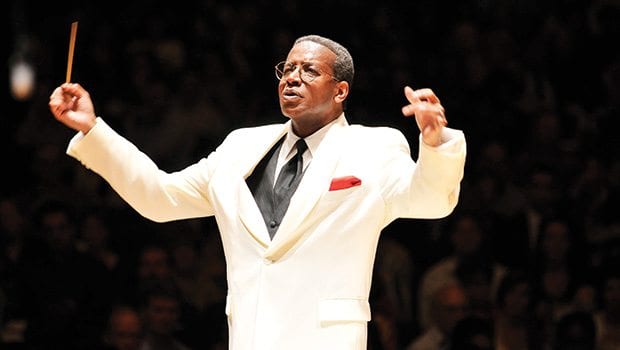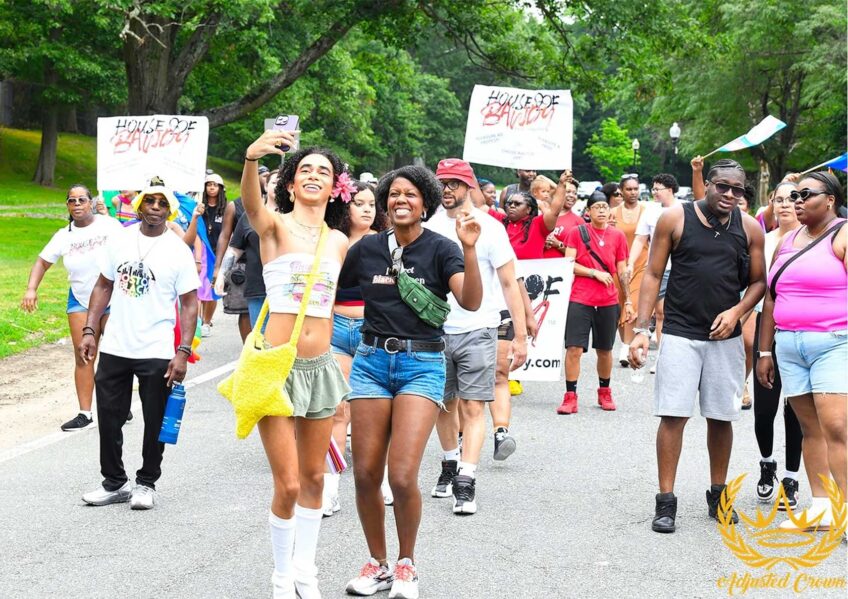
Bringing together the dual powers of the African-American gospel music tradition and a symphony orchestra, last Saturday’s annual Gospel Night at the Boston Pops injected Symphony Hall with jubilation and devotion.
Exciting ear, eye and spirit from the start, the Saturday evening concert alive with a sense of spectacle and occasion. The event was orchestrated by distinguished conductor, pianist and composer Charles Floyd, who has conducted Gospel Night for all but two of its 23 years.
Like the nearly 100 musicians who filled the grand stage, Floyd was attired in summer whites. The hall was transformed, its symphony-season rows of seats replaced by cabaret-style tables and chairs.
Using his long arms and hands and expressive body to direct the orchestra, Lloyd began the program with four orchestral pieces. The first, pastoral in tone, was Petite Suite de Concert, Op. 77 (1911), by acclaimed Afro-British composer and conductor Samuel Coleridge-Taylor. An early Bach composition, “Little Fugue in G Minor” featured clarinet and trombone, strings, brass and percussion in a sumptuous, buoyant orchestration that rose to a tidal crescendo. Following a tender rendition of “Shepherd Boy” (1891) by Edvard Grieg, the orchestra performed the romantic theme of the 1960 movie “Exodus,” by Ernest Gold, moving through its surging melody like a single organism.
Next, the Blind Boys of Alabama came on stage, turning the hall into a haven of praise with an R&B backbeat. The renowned five-man gospel ensemble opened with Curtis Mayfield’s irresistible “People Get Ready.” Currents of orchestral brass joined Paul Beasely’s yearning falsetto in a majestic rendering of this ’65 hit, now an anthem.
Floyd’s bravura conducting, fluent in both African American and European classical musical traditions, was never more evident than in his treatment of “This May be the Last Time.” Floyd silenced the orchestra as the Blind Boys began leading the audience in synchronized clapping to their rousing rendition of a hymn about endings of all kinds.
Energizing their dirge-like arrangement of “Amazing Grace” to the tune of “House of the Rising Sun” were potent bass guitar and drum riffs and the raspy, rough voice of Jimmy Carter as he chanted with ever-mounting intensity its refrain, “I’m talking about grace/Amazing grace.”
A spiraling organ line introduced and accompanied “There Will Never Be Any Peace (Until God is Seated at the Conference Table)” in a treatment that kept its R&B groove intact. The Blind Boys rendering of the song by Eugene Record and Barbara Acklin, which debuted in 1974 by the Chi-Lites, unfolded like an urgent conversation between Beasely and the audience. His yellow shirt cuffs accented his fingers and hands as they reached skyward or jabbed into the audience. He alternatively crouched and sprang up while repeating the refrain, “We need peace,” his falsetto making its pulsing ascent to the coffered ceiling of the hall.
After a brief intermission, the Pops Gospel Choir — the 120-voice Boston Community Choir — streamed onstage. Wearing stately blue robes with multicolored sashes, they formed four rows behind the orchestra. Before them was the sea of white-garbed musicians and Floyd on his podium, who swayed in unison with the singers.
Soloists, singly or in pairs and threesomes, took turns stepping up alongside Floyd to lead the songs. The first began by inviting everyone to “give God all praise.” Joyful incantations and searing testimonials were equally convincing, as the singers made it clear that nothing in the world mattered as much as the business at hand.
Floyd directed both the chorus and orchestra as a single vehicle of exalted expression. Interweaving organ and drum solos with cascading orchestral passages, the arrangements demonstrated the values of individuality and harmony at the core of the African American gospel tradition. Now and then, Floyd used his voice along with his body to propel the music and its multiple parts. For example, in one song, Floyd repeated the word “with, with, with, with, with” along with the chorus, until the pulsing passage reached its soaring climax by adding the phrase “with my soul.”
Floyd and the orchestra departed to a standing ovation. The choir remained on stage and Dennis L. Slaughter, their artistic director, conducted them in two exuberant, highly rhythmic encores. The choir then shimmied off the stage.
Yet the spirit — and the music — kept moving. Slaughter then led an impromptu sextet with the choir’s musicians, visible for the first time on the otherwise empty stage. Conducted by a dancing Slaughter, the musicians — pianist and keyboardist Jerome Kyles, organist Dennis Montgomery, bassist Wayne Pittman and drummer Sean Skeete — traded and crossed rhythms until they reached and released a final exhale of exalted energy.






